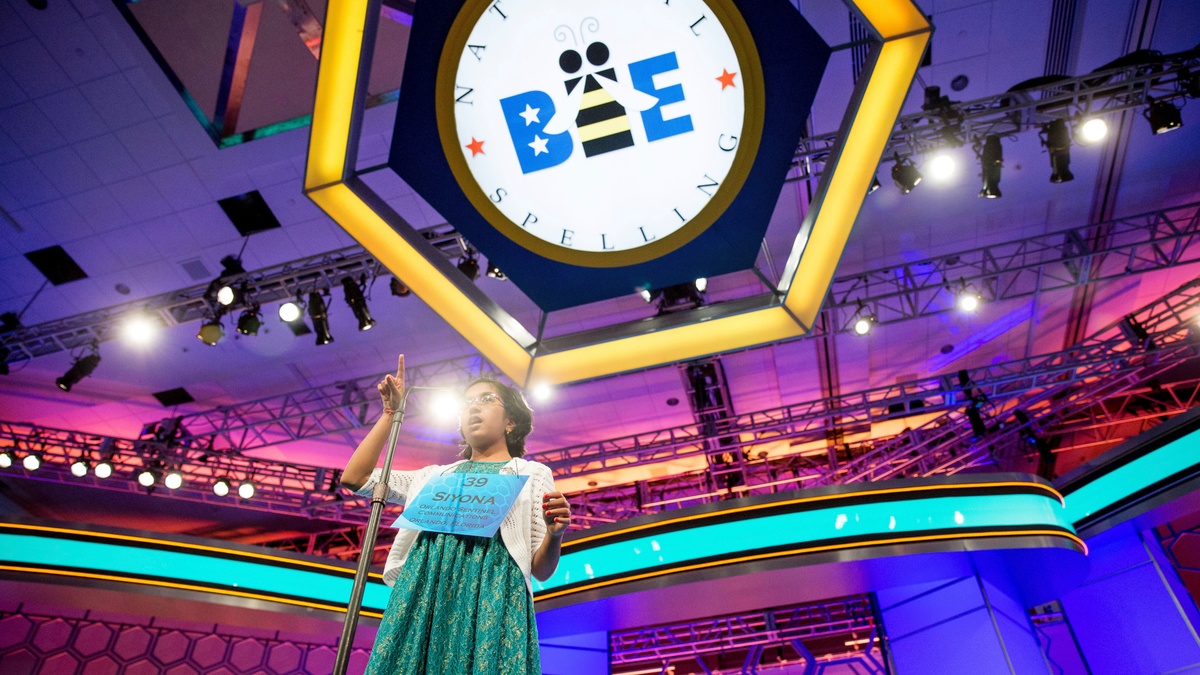
WASHINGTON – For three years running, Siyona Mishra and Dhyana Mishra faced off amid some of the highest stakes in competitive spelling.
They outlasted the rest of the field at the regional spelling bee in Orlando, Florida. But there was only room at the Scripps National Spelling Bee for one of them. Siyona finished eighth overall at nationals in 2015, but last year, she lost the regional bee to Dhyana — the two are not related — and had no way to return.
Under a rule change announced by Scripps on Tuesday, the stakes would be much lower when spellers like the Mishras clash.
Scripps is establishing a new path to the national bee that could result in the field of spellers nearly doubling, from fewer than 300 to more than 500. Any speller who wins a school-level bee will now have the opportunity to request a wild-card invitation to the national bee. Scripps will hand out up to 225 wild cards, giving top priority to those who have been to nationals before and then to older spellers who are running out of eligibility. The bee is open to students through the eighth grade.
The motivation behind the change is to level the uneven playing field at regional bees, which previously offered the only path to the finals. A handful of regions are extraordinarily competitive, with the winners immediately entering the conversation as potential bee champions. For the runners-up, it can be a bitter experience to watch less accomplished spellers compete on the biggest stage.
"We are aware of so many stories, so many different situations, kids who've been runners-up to, let's say ... a kid who was in our top 20 for four consecutive years. That runner-up might have been good enough to make our finals, but because of the way the contest was structured, that child never even got a chance to go to Washington," Paige Kimble, the bee's executive director, told The Associated Press ahead of the announcement. "We really want to do as much as we can to address fairness and make the playing field more even."
The 92-year-old spelling bee — staged annually around Memorial Day at a convention center outside Washington — has grown in popularity and difficulty since ESPN began broadcasting the finals in 1994, and it has also become a showcase for children of Indian descent, who have accounted for 18 of the past 22 champions.
There are roughly 275 regional bees, including a handful overseas. But 25 percent of the 11 million spellers who participate in the Scripps program are concentrated in just eight regions.
One such region is Dallas, where Ananya Kodali lost two straight years to Smrithi Upadhyayula, who went on to finish fifth in the national bee. Ananya got a measure of revenge in their friendly rivalry when she beat Smrithi in the finals of the North South Foundation, another national bee that serves as a training ground for future Scripps champions or, in Ananya's case, a consolation prize.
Several current and former spellers said they were pleased by the rule change.
Sylvie Lamontagne finished ninth in her first appearance at nationals and then had to persuade the sponsor of her regional bee, the Denver Post, to change its rules to allow repeat champions. She finished fourth her second time and now coaches younger spellers.
"I really, really like the rule," Sylvie said. "There have been lots of people who were even favorites to win and returning finalists or semifinalists who lost at regionals and would have had an amazing shot at nationals."
Dhyana Mishra, who's 13 and has two years of competition left after losing twice to Siyona, said she feels "a little bit less pressure" under the new system, although she still wants to win her region.
There are still questions about how the new system will play out and whether Scripps can avoid arbitrarily picking which spellers receive invitations. The company has not established a scoring system to evaluate the resumes of spellers who apply, beyond ranking them based on their previous performances at nationals and their age.
Shaheer Ali Imam likely would have benefited from the wild-card system — this year, he set a record for the longest gap (five years) between appearances at nationals. But he feels like the new rule would cheapen his accomplishment and make the regional bees less exciting.
"This would be a bit unfair to those who actually win their regional bees," Shaheer said.
There's also a financial catch: While sponsors pay for regional winners to travel to Washington for the bee, those who get invitations will have to pay a $750 entry fee and cover their own travel, food and lodging costs. That's one reason Kimble says she's not sure how many people will apply.
But if the bee ends up adding the maximum 225 spellers — 291 competed last year — Kimble is fine with that, saying it's time for the bee to grow.
Winning the regional bee will come with the same spoils: a guaranteed, expenses-paid spot at nationals. But it won't be a win-or-go-home proposition anymore.
"For me, it was one letter wrong, just one letter and you could be out for the year. That happened to a lot of friends," said Stuti Mishra, Dhyana's older sister and the 2012 national runner-up. "That added to the stress. With this new process, it seems like it kind of takes that element away."
___
This story has been clarified to reflect that spellers will not be ranked on criteria other than age and previous appearances at nationals.
___
Follow Ben Nuckols on Twitter at https://twitter.com/APBenNuckols









































